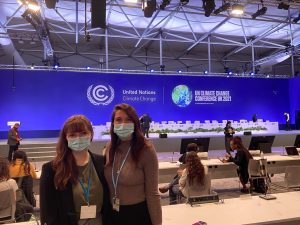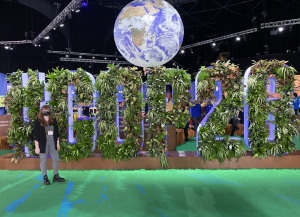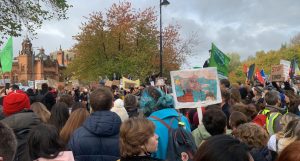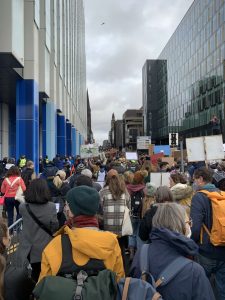Maura Kitchens West ’22 is a TAM student in Berlin. She recently traveled to Scotland for COP26. Please read about her reflections below:
I attended COP26 and would like to share some brief personal reflections on my experience.


The United Nations Framework Convention on Climate Change (UNFCCC) recognizes 9 civil society constituencies (Business and industry NGOs (BINGO), Environmental NGOs (ENGO), Farmers, Indigenous peoples organizations (IPO), Local government and municipal authorities (LGMA), Research and independent NGOs (RINGO), Trade union NGOs (TUNGO), Women and Gender (WGC), and Youth NGOs (YOUNGO)).
A Disability Caucus was formed at this COP, which is expected to be included at COP27 in official events.
I held a yellow delegate-observer badge from the University of North Carolina at Chapel Hill, so I caucused with the RINGOs, which is the only non-advocacy constituency in the UNFCCC. Individuals and delegations within the RINGOs can make statements/advocate for issues; however, the RINGOs as a constituency rarely emphasize specific policies unless they center on science- and data-based approaches to policymaking.
That being said, I participated in a walkout of the plenaries on Friday, November 12, led by CSOs, which officially included the RINGOs. We met with additional CSOs stationed outside the official ‘blue-zone’ to protest the lack of transparency and democratic process in negotiations throughout the conference. You can briefly see me in the following videos if you search hard enough! I would highly recommend watching the People’s Summit to get a sense of CSOs’ experiences throughout the week.
Our UNC- POC was Angel Hsu, whose op-ed was published in the NYT! https://www.nytimes.com/2021/11/07/opinion/cop26-china-climate.html


I also participated in the Fridays for Future strike on Friday, November 5, and the climate protest march on November 6 ~100,000 people participated.
There are plenty of briefs concerning the official accomplishments of the conference, so I won’t repeat them here. Rather, I’ll share my on-the-ground experiences.
- Communication regarding testing guidelines was sporadic prior to the conference, and COVID-19 protocols were incredibly lenient. Case numbers in Glasgow skyrocketed.
- Accessibility issues were rampant at the venue. The press highly publicized the experience of an Israeli energy minister being unable to attend the first day of the World Leader’s Summit because she uses a wheelchair. In addition, interpreters were sparse, sign-language interpreters were not provided, and the event had limited accessible options for wheelchair users.
- The heavily encouraged COP26 online platform for badged delegates was not user-friendly and saw major technical issues for those who were unable to attend in person.
- The venue filled to maximum capacity each day around 11:00 am, leaving many in Glasgow unable to enter the venue. The UK Presidency issued thousands more delegate badges than could attend the venue without breaking COVID protocols. Many question why the number of badges approved was higher than the venue could maintain.
- Negotiations remained closed. At previous COPs, all official negotiations remained open to observers and press (if there wasn’t room at a table in the room, observers were encouraged to sit on the floor, etc.); at this COP, doors remained closed with observers allowed to attend only informal meetings, side events, and high-level plenaries. No negotiations were broadcast on the COP26 platform, and civil society was locked out of the negotiating stage of the conference.
- Due to the increased urgency of climate advocates and the public, NGO attendance at COP increased by around 60-70% this year, with 11,000+ individuals receiving UNFCCC accreditation from the UK Presidency. Similarly, press and media representatives increased by ~230%, an indication which many at the conference believed to be an intentional decision. Many argue that while the event was heavily publicized, little progress was made before and during the conference as a direct result of the UK Presidency’s actions.
Looking towards Sharm El Sheikh (COP27) –
One primary reason for the Paris Agreement’s relative’ success’ (I’ll use this term lightly), is the amount of diplomatic heavy-lifting France performed before COP21. The UK Presidency failed to engage with the international community adequately in the lead-up to COP26. So, advocates are hoping that Egypt steps up diplomatic relations in the coming months. COP28 will take place in the UAE.
Helpful resources:
This ‘Climate negotiations terminology: the pocket guide’ is quite helpful for looking at the drafts/finalized texts from COPs to decipher meanings. https://pubs.iied.org/10148iied
This glossary from the UNFCCC is a lifesaver when looking at seemingly endless acronyms. https://unfccc.int/process-and-meetings/the-convention/glossary-of-climate-change-acronyms-and-terms